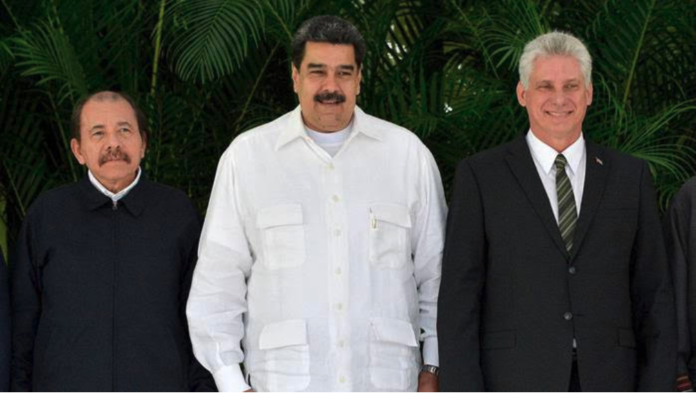Once again, politicians in the U.S. are entangling the internal politics of their country with U.S. obligations to the international community.
This time Senator Rick Scott, a Republican from the State of Florida, wants the Biden administration to deny visas to three Latin American and Caribbean leaders, stopping them from attending next month’s General Assembly of the United Nations (U.N.) in New York.
Reminiscent of last June’s Summit of the Americas in Los Angeles, Senator Scott wrote President Biden on August 24, urging him “to deny visas for Miguel Díaz-Canel (Cuba), Daniel Ortega (Nicaragua), Nicolás Maduro (Venezuela), and their respective delegations to attend the United Nations General Assembly meetings”. Similar calls were made on President Biden, prior to the Summit of the Americas, to exclude Díaz-Canel, Ortega and Maduro.
These calls have much to do with mid-term elections in November that will decide whether the Republican or Democratic party will control the U.S. Senate. They have come from members of the U.S. Congress and vocal groups of exiles who want regime change in Cuba, Venezuela, and Nicaragua.
For the Summit of the Americas, President Biden bowed to the political risk his party would face at the mid-term elections, particularly in Florida. He did not invite the three leaders to attend.
This decision, occasioned criticism from governments of several Latin American and Caribbean countries. Many Caribbean governments, in the interest of tackling urgent problems that confronted their countries, requiring international cooperation, opted to attend with the understanding that, at the meeting, they would strongly represent the interests of the Cuban and Venezuelan governments.
Other governments continued not to accept President Biden’s decision to exclude Díaz-Canel, Ortega and Maduro. Notable among these, were the governments of Mexico and St Vincent and the Grenadines, both of whose leaders boycotted the Summit. The last thing President Biden should want is a large-scale boycott of a U.N. General Assembly while major issues confront the global community.
So, President Biden is, again, caught on the horns of a dilemma. He recognizes the importance for his party and his administration of the Florida mid-term Senate elections and the contest for the State’s Governorship. At the same time, he knows that the U.S. government has obligations to the U.N. organization which are enshrined in the agreement that established the headquarters in New York. Refusing visas for leaders to attend U.N. meetings is inconsistent with the terms of the headquarters agreement.
The stakes are high in Florida. The Democrats are trying both to unseat Republican Senator, Marco Rubio, who is virulently opposed to the governments of Cuba, Venezuela, and Nicaragua, and to replace Republican Governor Ron DeSantis, who is also working for the nomination by the Republican Party for the 2024 U.S. Presidential elections. The exile Latin American community is a powerful voting force in Florida.
Close races in other States, including New York, where the exile Latin American community is also virulent, are also likely to be affected by the political storm being created over the U.N. attendance by the three leaders.
Undoubtedly, in the weeks ahead, many governments around the world are likely to publicly voice their disapproval of what would be an effective U.S. prohibition of the attendance of the Cuban, Nicaraguan and Venezuelan governments at a meeting of the U.N. of which they are members, should President Biden decide to deny them visas.
Senator Rick Scott urged President Biden not only to deny visas to the leaders of the three countries, but also “to their respective delegations”. Obviously, this is meant to exclude Foreign Ministers and Ministerial representatives. He justifies his urging to President Biden with the argument that, “These oppressive dictators and their regimes engage in activity that continues to threaten the stability of Latin America and the national security of the United States”.
Curiously, Senator Scott must imbue these three leaders with remarkable capacity to influence world leaders and sway international public opinion, simply by speeches they make at the U.N., and meetings they might have with representatives of other countries.
Even at the height of the 1962 ‘Cuban missile crisis’ between the U.S. and the Soviet Union, the Russian leader, Nikita Khrushchev, was not denied a visa to address the U.N.
To achieve what Senator Scott is urging, President Biden would have to breach provisions of the 1947 headquarters agreement with the U.N. These provisions include the obligation of the U.S. government to provide visas to foreign dignitaries to access the U.N. “promptly”. And while the U.S. Congress added a note to the agreement, prescribing that “Nothing in the Agreement shall be construed as in any way diminishing, abridging or weaking the right of the United States to safeguard its own security”, it should take much more than the attendance of the three leaders at the U.N. General Assembly to threaten U.S. security.
In any event, the U.N. is an international organization, headquartered in the U.S. because the U.S. wanted it, and benefits from its activities in New York. Having the benefits of the headquarters comes with obligations which must be fulfilled for the U.N. to promote its principles – among which is, “To achieve international co-operation in solving international problems of an economic, social, cultural, or humanitarian character, and in promoting and encouraging respect for human rights and for fundamental freedoms for all”.
Prohibiting the opportunity to pursue this principle – to benefit the narrow purpose, described by Senator Scott as, not affording the three leaders “a legitimacy they have neither earned nor deserve” is akin to throwing out the baby with the bath water.
The principle – and upholding it – must be greater than satisfying narrow, political purposes in one country.
There is not even certainty than any of the leaders want to attend the General Assembly. But it would be wrong to restrict them from doing so. Instead, the U.S. and others have the right to respond to their statements with counter arguments.
Debating the issues is why the U.N. holds general assemblies.
